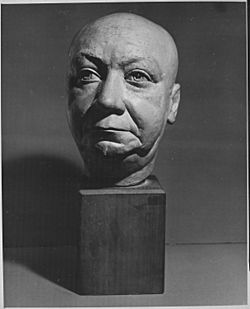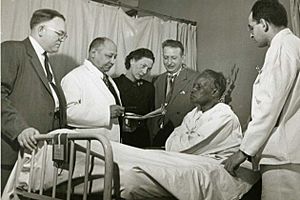Louis T. Wright facts for kids
Quick facts for kids
Louis Wright
|
|
|---|---|

Louis T. Wright (sculpture by William E. Artis)
|
|
| Born | July 23, 1891 LaGrange, Georgia, U.S.
|
| Died | October 8, 1952 (aged 61) New York City, U.S.
|
| Alma mater | Harvard Medical School Clark Atlanta University |
| Known for | First African-American surgeon at Harlem Hospital; Chairman of the NAACP |
| Awards | Spingarn Medal Purple Heart |
| Scientific career | |
| Fields | Medicine |
| Institutions | Harlem Hospital, National Association for the Advancement of Colored People |
Louis Tompkins Wright (July 23, 1891 – October 8, 1952) was an American doctor and civil rights leader. He was the first African-American surgeon at a non-segregated hospital in New York City, Harlem Hospital. Dr. Wright was important for his medical research. He also worked hard for racial equality in medicine. He led the National Association for the Advancement of Colored People (NAACP) for almost 20 years.
Contents
Growing Up and Family Life
Louis Wright was born in LaGrange, Georgia. His father, Ceah Ketchan Wright, was born into slavery. But he went to medical school and became a doctor. Louis's father passed away soon after he was born. His mother, Lula Tompkins, later married another doctor, William Fletcher Penn.
William Fletcher Penn was the first African-American to graduate from Yale School of Medicine. He became a well-known doctor in Atlanta. He was also the first African-American in Atlanta to own a car. Louis saw the unfair treatment his stepfather faced because of racism. This strongly influenced Louis's life and career.
Education and Early Career
Louis Wright graduated from Clark Atlanta University in 1911. He then earned his medical degree from Harvard Medical School in 1915. He finished fourth in his class. Getting into Harvard Medical School was not easy for him. One interviewer, Dr. Channing Frothingham, doubted him because he attended a college that allowed Black students. But after many tests, Dr. Frothingham agreed that Louis was smart enough.
After Harvard, Louis completed his training at Freedmen's Hospital in Washington, DC. He then returned to Georgia.
Family Life and Legacy
Louis married Corinne Cooke, who was a school teacher. They had two daughters, Jane Cooke Wright and Barbara Wright Pierce. Both of their daughters also grew up to become doctors and researchers.
Medical Achievements
After medical school, Louis Wright joined the Army Medical Corps. He served as a lieutenant during World War I in France. While there, he started using a new way to give vaccinations for smallpox. He was given the Purple Heart medal after being hurt in a gas attack.

Innovations at Harlem Hospital
In 1919, Dr. Wright moved to New York City. He opened a private practice in Harlem. He also started working at Harlem Hospital. He was the first African-American doctor on the surgical team there. Dr. Wright made big improvements at Harlem Hospital. He worked to make sure the hospital had high standards for patient care and professionalism. His changes were so good that other hospitals across the country started to use them.
In 1929, he became the first African-American police surgeon for the New York City Police Department. During his 30 years at Harlem Hospital, he did many important things. He started the Harlem Hospital Bulletin, a medical publication. He led the team that first used a new antibiotic called chlortetracycline on humans. He also started the hospital's cancer research center. He became known as an expert on head injuries. He was a member of the American College of Surgeons and the American Medical Association.
Fighting for Civil Rights
Louis Wright was involved in civil rights efforts his whole life. In college, he missed three weeks of school to protest a movie called The Birth of a Nation. This film was controversial because it showed the Ku Klux Klan in a good way. At Harvard, he demanded fair treatment when a professor tried to stop him from helping white patients.
After medical school, he joined the NAACP. He stayed involved with the group for the rest of his life. He eventually became the chairman of its national board of directors.
Advocating for Equality in Medicine
Dr. Wright's work with the NAACP was very important. For nearly ten years, he wrote articles for The Crisis, the NAACP's magazine. Many of his writings talked about issues that Black authors still discuss today. He challenged false ideas that Black people were more likely to get certain diseases because of their race.
He was a strong leader in the fight for integration, especially in medicine. In 1920, he helped fight against a rule in New York. This rule stopped African-American doctors and nurses from working in city hospitals. He was against hospitals that separated patients by race. In 1930, he successfully stopped a plan to build a new segregated hospital. He worked for equal opportunities in medicine and medical education. He pushed for higher standards for Black medical students.
In 1940, he received the Spingarn Medal. This award recognized his work in healing people and his brave stand against unfair attacks.
There is no such thing as Negro health ... the health of the American Negro is not a separate racial problem to be met by special segregated setups or dealt with on a dual standard basis, but is an American problem which should be adequately and equitably handled by the identical agencies and met with the identical methods that deal with the health of the remainder of the population.
Later Life and Lasting Impact
Louis Wright had health problems after his time in the war. He was in the hospital for tuberculosis from 1939 to 1942. He went back to medicine after that. In 1943, he became the chief of surgery. But he never fully recovered and passed away in 1952 at age 61.
Throughout his career, Dr. Wright published many research papers. His work was important in several areas. This included how to treat infections with antibiotics, cancer research, chemotherapy, treating head injuries, and fixing broken bones.
The library at Harlem Hospital was renamed in his honor just before he died.
"What the Negro physician needs is equal opportunity for training and practice—no more, nor less."
— Louis T. Wright
See also
 | George Robert Carruthers |
 | Patricia Bath |
 | Jan Ernst Matzeliger |
 | Alexander Miles |

